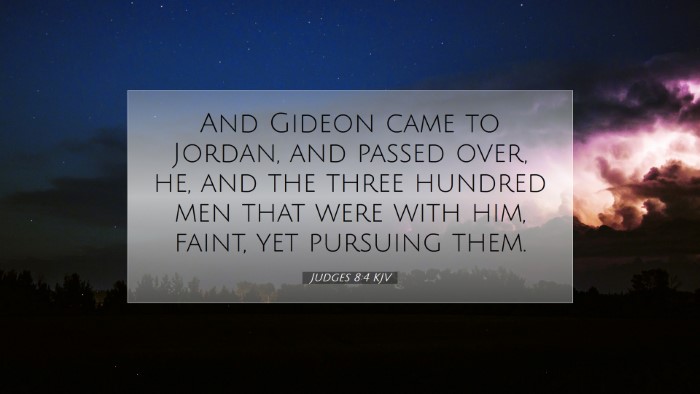Commentary on Judges 8:4
Judges 8:4 states, "And Gideon came to Jordan and passed over, he, and the three hundred men that were with him, faint, yet pursuing them." This verse encapsulates both a moment of exhaustion and determination as Gideon and his men continue to pursue the enemy despite their weariness.
Contextual Background
The Book of Judges outlines a tumultuous period in Israel's history, characterized by cycles of sin, oppression, repentance, and deliverance. Gideon’s narrative serves as a pivotal example of God raising a leader to deliver Israel from oppression by the Midianites. The backdrop of this verse involves the defeat of Midian at Gideon’s hands, showcasing God's power and the faith of Gideon and his small band of warriors.
The Exhaustion of Gideon and His Men
The phrase "faint, yet pursuing" epitomizes a critical paradox that often occurs in the life of a believer. As noted by Matthew Henry, this phrase illustrates that spiritual and physical exhaustion do not preclude one from continuing the fight.
Henry explains:
"Though they were weary, they would not give up the pursuit, for they were motivated by a zeal for their God and their nation."
- Spiritual Resilience: The fatigue experienced by Gideon and his men reflects how spiritual battles can manifest in physical weariness. However, their perseverance exemplifies the strength that comes from God. This is a rich theme that resonates with students of Scripture, encouraging them to find strength in divine purpose.
- The Nature of Leadership: Gideon’s leadership shines through in this verse. Albert Barnes elucidates the role of a leader in motivating others, explaining, "True leaders inspire their followers to push beyond limitations."
Significance of the Pursuit
The act of pursuing an enemy symbolizes the ongoing spiritual warfare believers face. Adam Clarke comments that the pursuit represents the continuous effort to confront and overcome sin, evil practices, or challenges that besiege the soul. This dynamic of pursuit is essential for those in ministry and theology:
- Pursuit of Righteousness: Just as Gideon pursued his enemies, believers are called to earnestly seek righteousness and God’s Kingdom, as noted in Matthew 6:33. The drive to pursue cannot be overstated in the life of a disciple.
- Community in Effort: The fellowship of Gideon and his men signifies the collective strength found in community. Commentators emphasize the importance of unity in the body of Christ, highlighting how mutual encouragement fortifies believers in their pursuit of holiness.
The Role of Divine Empowerment
The narrative emphasizes that Gideon’s success is not solely attributed to his military strategy but rather to God’s empowering presence in his life. Henry points out that even when the army of Israel was small, their victory was assured because it was directed by God's hand. The faintness of Gideon’s men did not diminish their capacity for victory; rather, it showcased the faithfulness of God who strengthens the weary.
Theological Reflections
This verse invites deep theological reflection on the nature of dependence on God in times of weakness. Clarke elucidates that "God's strength is made perfect in weakness," echoing the words of Paul in 2 Corinthians 12:9. Believers are reminded that their struggles can lead to God’s glory when they remain steadfast in pursuing His purposes.
Practical Applications
Pastors and theologians can draw from Gideon’s experience several practical applications for ministry:
- Encouragement in Ministry: Leaders should remember that spiritual exhaustion does not negate their calling. Encourage congregants to press on, even when weary.
- Focus on God’s Power: Reliance on God during challenging times should be a central theme in sermons and teachings. Lion-hearted faith in God’s empowerment can catalyze transformation in communities.
- Unity in Pursuit: Foster a community of shared mission and cooperation. Just as Gideon operated with a select group committed to their cause, churches should cultivate involvement in collective pursuit for God’s Kingdom.
Conclusion
Judges 8:4 serves as a poignant reminder of the intersection of human weakness and divine strength. It encapsulates the believers’ journey in faith—a journey that thrives on perseverance, community, and the unfailing empowerment from God. As pastors, students, theologians, and scholars reflect on this passage, may they find encouragement to pursue God fervently, even when faced with fatigue, knowing that their labor is never in vain.


